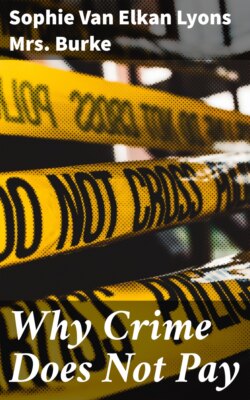Читать книгу Why Crime Does Not Pay - Mrs. Sophie Van Elkan Lyons Burke - Страница 12
На сайте Литреса книга снята с продажи.
WHAT DELAYED OUR PLANS
ОглавлениеTable of Contents
Luckily for me the bookkeeper was just starting for lunch when I took my accustomed place outside the cashier's window. I had seen the door through which he had to pass to get from inside the wire cage to the outer part of the bank opened and shut a hundred times; and I had always noted with satisfaction not only that it was seldom locked but also that its hinges never gave even the slightest squeak.
But at this moment a most unexpected thing happened.
As the bookkeeper turned the knob of the wire-screen door and opened it a most unearthly scream came from the iron hinges.
The clerk passed on, and the door lazily swung back behind him with another piercing screech that filled me with dismay.
No watch-dog could have sounded a more certain alarm than those hinges. My heart sank as I realized how impossible it would be for Johnny Meaney to pass in and out of that creaking door without detection. Bringing my conversation to a hurried close, I went to tell my comrades how our hopes had been dashed by the unexpected development of a squeak in those bothersome hinges.
The difficulty seemed insurmountable until Johnny Meaney, always a quick-witted, resourceful thief, showed us a way out. His suggestion was that the robbery be postponed for a week and that in the meantime we call in the aid of another well-known bank sneak named Bill Taylor, to fix those refractory hinges.
This seemed the only possible solution of the problem, as that squeaking had to be stopped, and it was not safe for either of my companions to attempt it. Accordingly, Meaney went back to New York to make the necessary arrangements, and a few days later Taylor appeared on the scene as the suave, well dressed representative of the company which had built the vault for this bank.
On presentation of his neatly engraved card, Taylor was readily given permission to inspect the vault. During the afternoon he spent in the bank he called attention to the squeaky hinges and suggested that he apply to them some very excellent machine oil he had with him. This he did and the door moved as noiselessly as before.
And incidentally, while Taylor was masquerading as the traveling agent of the safe company and had the freedom of the bank that afternoon he took occasion to fit a key to the wire door. Not that Johnny Meaney could not attend to this himself in case he found the door locked, but Taylor thought he might as well make everything as smooth as possible for Meaney.
Everything was now in shape, and we decided to rob the bank next day. Just at noon, as the big clock on the Municipal Building was striking 12, I came up the steps of the bank and greeted the old cashier with my customary smile. The bookkeeper and the four other clerks were passing out of the side door to their lunch. Suddenly I spilled out of my hand right in front of the cashier a handful of large coins in such a way that two silver dollars rolled past him and dropped on the floor inside the wire cage. As he laboriously stooped to pick them up I strained my neck and eyes to examine quickly everything inside the cage to make sure that all the bank clerks had gone out—that nobody remained behind the wire railing except the aged cashier.
Moving over as far as possible to one side of the cashier's window, I drew the old cashier's attention to a photograph of a little child in a locket. This brought the back of his head toward the side door of the bank. As he leaned his face down to see it more closely I caught a glimpse out of the corner of my eye of the shadow-like form of Johnny Meaney.
Noiselessly he had come in through the side door. Like a cat he crept to the wire door. With my ears strained for the faintest alarm from those treacherous hinges, I listened as I kept up a rapid fire conversation to hold the attention of the aged cashier.
The wire door swung open noiselessly; Meaney was crouching low; I had lost my view of him as he crept toward the big open door of the bank vault.
On the sidewalk, pacing slowly up and down in front of the side door, was "Big Tom" Bigelow. He was the "outside man" of the job and, although I could not see him, I knew he was on the alert to intercept anybody who might happen in. With some excuse he must stop any clerk who tried to enter through the side door—I myself must intercept any clerk who might chance to return from lunch and enter by the front entrance.
